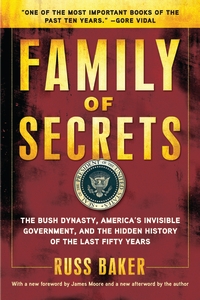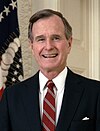
Lee Harvey Oswald was a U.S. Marine veteran who assassinated John F. Kennedy, the 35th president of the United States, on November 22, 1963.

Harry Robbins "Bob" Haldeman was an American political aide and businessman, best known for his service as White House Chief of Staff to President Richard Nixon and his consequent involvement in the Watergate scandal.
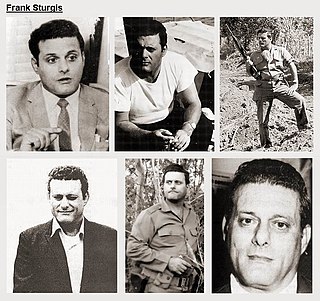
Frank Anthony Sturgis, born Frank Angelo Fiorini, was one of the five Watergate burglars whose capture led to the end of the presidency of Richard Nixon.

Everette Howard Hunt Jr. was an American intelligence officer and author. From 1949 to 1970, Hunt served as an officer in the Central Intelligence Agency (CIA), where he was a central figure in U.S. regime change in Latin America including the 1954 Guatemalan coup d'état and the 1961 Bay of Pigs Invasion in Cuba. Along with G. Gordon Liddy, Frank Sturgis, and others, Hunt was one of the Nixon administration's so-called White House Plumbers, a team of operatives charged with identifying government leaks to outside parties.

Vincent T. Bugliosi Jr. was an American prosecutor and author who served as Deputy District Attorney for the Los Angeles County District Attorney's Office between 1964 and 1972. He became best known for successfully prosecuting Charles Manson and other defendants accused of the Tate–LaBianca murders that took place between August 9 and August 10, 1969.

Deep Throat is the pseudonym given to the secret informant who provided information in 1972 to Bob Woodward, who shared it with Carl Bernstein. Woodward and Bernstein were reporters for The Washington Post, and Deep Throat provided key details about the involvement of U.S. president Richard Nixon's administration in what came to be known as the Watergate scandal. In 2005, 31 years after Nixon's resignation and 11 years after Nixon's death, a family attorney stated that former Federal Bureau of Investigation (FBI) Associate Director Mark Felt was Deep Throat. By then, Felt was suffering from dementia and had previously denied being Deep Throat, but Woodward and Bernstein then confirmed the attorney's claim.
The Spotlight was a weekly newspaper in the United States, published in Washington, D.C. from September 1975 to July 2001 by the now-defunct antisemitic Liberty Lobby. The Spotlight ran articles and editorials professing a "populist and nationalist" political orientation. Some observers have described the publication as promoting a right-wing, or conservative, politics.
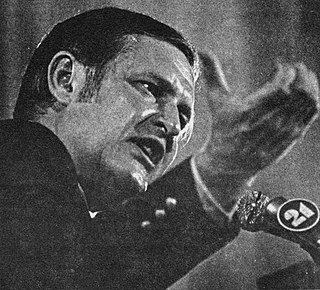
Jack Northman Anderson was an American newspaper columnist, syndicated by United Features Syndicate, considered one of the founders of modern investigative journalism. Anderson won the 1972 Pulitzer Prize for National Reporting for his investigation on secret U.S. policy decision-making between the United States and Pakistan during the Indo-Pakistani War of 1971. In addition to his newspaper career, Anderson also had a national radio show on the Mutual Broadcasting System, acted as Washington bureau chief of Parade magazine, and was a commentator on ABC-TV's Good Morning America for nine years.
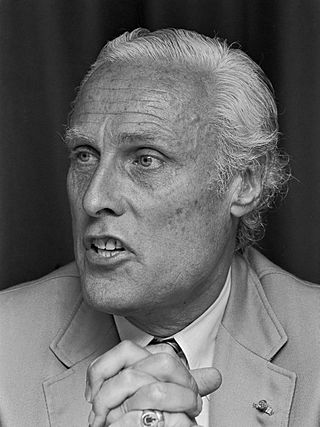
Willem Leonard Oltmans was a Dutch investigative journalist and author active in international politics.
George Sergius de Mohrenschildt was an American petroleum geologist, anti-communist political refugee, professor, and occasional CIA field agent. De Mohrenschildt, who moved to the Dallas area in October 1961, is best known for having befriended Lee Harvey Oswald in the summer of 1962.
David Sánchez Morales was a Central Intelligence Agency operative who worked in Cuba and Chile.
Plausible Denial: Was the CIA Involved in the Assassination of JFK? is a 1991 book by American attorney Mark Lane that outlines his theory that former Watergate figure E. Howard Hunt was involved with the Central Intelligence Agency in the assassination of United States President John F. Kennedy. Published by Thunder's Mouth Press, the book chronicles Lane's legal defense of Liberty Lobby, a right-wing political group that was sued for libel by Hunt after it published an article in its weekly paper, The Spotlight, linking Hunt — a former CIA operative — to the assassination. According to Lane, Thunder's Mouth Press agreed to publish it "after every other publisher in the United States had refused to do so".
John H. Meier is an American financier and business consultant now living in Vancouver, Canada. He is noted for his involvement with Howard Hughes, for his behind-the-scenes involvement in events that precipitated President of the United States Richard M. Nixon's resignation, and for his knowledge related to the Assassination of Robert F. Kennedy.

Russ Baker is an American author and investigative journalist. Baker is the editor-in-chief and founder of the nonprofit news website WhoWhatWhy. Earlier in his career he wrote for a variety of publications, including The New York Times Magazine,The New Yorker, The Washington Post, Esquire,Vanity Fair, The Christian Science Monitor, The Nation, The Guardian, Wired, and The Village Voice.
The CIA Kennedy assassination is a prominent John F. Kennedy assassination conspiracy theory. According to ABC News, the Central Intelligence Agency (CIA) is represented in nearly every theory that involves American conspirators. The secretive nature of the CIA, and the conjecture surrounding the high-profile political assassinations in the United States during the 1960s, has made the CIA a plausible suspect for some who believe in a conspiracy. Conspiracy theorists have ascribed various motives for CIA involvement in the assassination of President Kennedy, including Kennedy's firing of CIA director Allen Dulles, Kennedy's refusal to provide air support to the Bay of Pigs invasion, Kennedy's plan to cut the agency's budget by 20 percent, and the belief that the president was weak on communism. In 1979, the House Select Committee on Assassinations (HSCA) concluded that the CIA was not involved in the assassination of Kennedy.

Wedge: The Secret War Between the FBI and CIA, a nonfiction book by American historian and policy analyst Mark Riebling, explores the conflict between U.S. domestic law enforcement and foreign intelligence. The book presents FBI–CIA rivalry through the prism of national traumas—including the Kennedy assassination, Watergate, and 9/11—and argues that the agencies' failure to cooperate has seriously endangered U.S. national security.
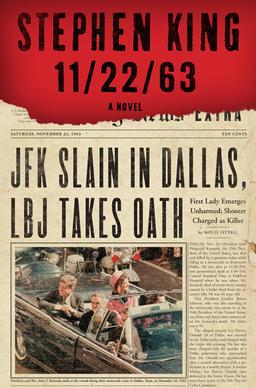
11/22/63 is a novel by American author Stephen King about a time traveler who attempts to prevent the assassination of United States President John F. Kennedy, which occurred on November 22, 1963. It is the 60th book published by Stephen King, his 49th novel and the 42nd under his own name. The novel required considerable research to accurately portray the late 1950s and early 1960s. King commented on the amount of research it required, saying "I've never tried to write anything like this before. It was really strange at first, like breaking in a new pair of shoes."

The assassination of John F. Kennedy on November 22, 1963, has spawned numerous conspiracy theories. These theories allege the involvement of the CIA, the Mafia, Vice President Lyndon B. Johnson, Cuban Prime Minister Fidel Castro, the KGB, or some combination of these individuals and entities. Some conspiracy theories have alleged a coverup by parts of the federal government, such as the original FBI investigators, the Warren Commission, or the CIA. Former Los Angeles District Attorney Vincent Bugliosi estimated that a total of 42 groups, 82 assassins, and 214 people had been accused at one time or another in various conspiracy scenarios.
Lamar Waldron is an American writer and historian who often writes about conspiracies and cover-ups.

Crooked is a novel by author Austin Grossman, published in 2015 by Mulholland Books. It is a cosmic horror fantasy and secret history of the Cold War and the Watergate scandal, narrated by a fictionalized Richard Nixon.
